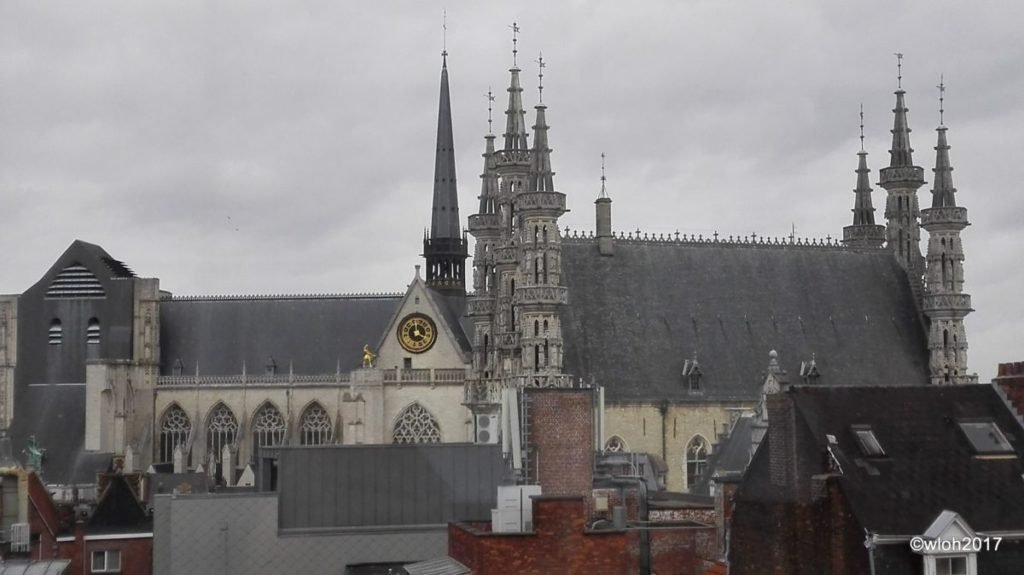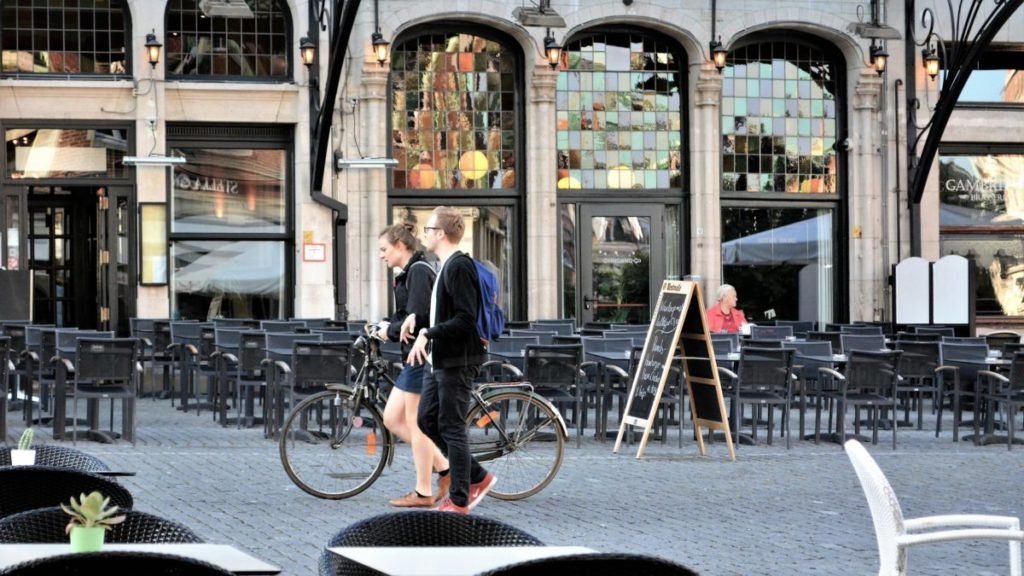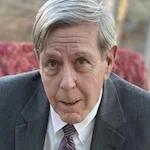
There was small marble sculpture of an aged figure on an unpretentious pedestal near the eastern end of St. Donatus Park, a leafy space in the old city of Louvain, Belgium. The figure was that of a seated elder with eyes wide open and a biblical beard; were there not an owl on his lap, were his hands not serenely folded, he might have been a prophet. The pedestal bore a placard, in Flemish, that read, “Wise is he who wants to know where Abraham gets the mustard.” The park had a wide dirt pathway, and I walked past the statue on my way to class each morning. Paused sometimes, read the sign again, wondered what it could possibly mean. But I was usually running late, and, by the time I reached the courtyard of the philosophy institute, I’d forgotten the ancient sage and his mystifying message. I had no time to spare.
***
I sailed from New York to Le Havre in August 1967, when I was twenty, took a train to Brussels, looked around, reached Louvain—in Flemish, Leuven—midmorning a few days later. I found a brasserie on the main street, ordered a filter coffee and a ham and cheese tartine, unfolded a map, tried to get my bearings. Louvain was a small, ringed city in the province of Brabant, ruins of the medieval wall were still visible, a thirteenth-century béguinage was undergoing restoration. The colleges of the Catholic university were scattered throughout the cobblestone streets, French- and Flemish-speaking faculties side by side, but the city was sparsely populated in the summertime, most of the students on vacation. I found the location of the philosophy institute on the map, walked there to get a sense of the place, three aging structures with lecture halls, reading rooms, offices, a bronze bust of a cardinal in the courtyard, seated, pen in hand.
I spent the first week in a hotel, used my traveler’s checks to open an account at the Société Générale de Banque, bought a car, a used VW Beetle, grey, manual transmission. I picked up a roll of red plastic tape, about three inches wide, and smoothed a length of it on the hood, right of center, from the windshield to the bumper. I thought of it as an ironic racing stripe, a dash of poetry on a prosaic vehicle, later realized that others assumed I was a communist, and that was all right, too, I was a liberal, not a communist, but art belongs to those who look and think, it’s theirs to interpret.
I found a room in a two-story house, yellow stucco, amber-tinted casement windows, in Oud Heverlee, a village some ten kilometers outside the city. The house had a small bathroom with running water on the second floor, sink and tub, no toilet; in a letter home I called it incommodious. There was, instead, an outhouse in the courtyard, not greatly bothersome when the weather was warm. Jeanne Vandezande, the owner, had survived both world wars, the first as a young girl. Her brother’s house was adjacent. I came to love the family, relished spending time with them, engaged in a light-hearted flirtation with their daughter, Bernadette, a schoolteacher my age. Their mother tongue was Flemish, but we spoke French.
The city was on edge in 1967, relations between the Walloons and the Flemings were tense. The francophones, my classmates, scorned the flamingants as a humorless, tradition-bound people, farmers who read only the local news, shopkeepers who knelt to wash their sidewalks the same day every week, wooden brushes, soapy water. The Walloons told mean-spirited jokes, traded witticisms that would have been racist had color been involved. Yet the times were changing, power was gradually shifting from the coal-mining, steel-working south to the agricultural and commercial north, from landlocked Wallonia to Flanders with its great ports. The trend would prove inexorable: today the Flemish zone adds about two-and-a-half times as much as the Walloon region to Belgium’s gross domestic product.
The unrest came to a head in November 1967, paused, it seemed, for the Christmas season, then resumed in January, when Flemish students marched through the streets, carried hand-lettered signs reading Leuven Vlaams and Walen Buiten. Flemish Louvain. Walloons Out. The demonstrators chanted, sang, set trashcan fires. Mobilized in force, the gendarmes tried to contain them with water cannons, the throng retreated, surged ahead again, finally occupied university buildings where student leaders spoke with passion in packed lecture halls. The university closed, the government resigned.
L’Université Catholique de Louvain was founded in 1425, when the cloth trade that had enriched Flanders for centuries was in the doldrums. The school I attended, l’Institut Supérieur de Philosophie, was a pontifical institute established in 1889 with a mandate to renew scholasticism in the face of modern secular thought. In 1938, however, Hermann Van Breda, a Franciscan priest with a doctorate in philosophy, saved Edmund Husserl’s manuscripts, his dogged studies in phenomenology, smuggled some 40,000 pages out of Nazi Germany, principally under diplomatic seal. I went to Belgium as an undergraduate student in a rather loosely organized junior-year-abroad program sponsored by my American college, but I stayed because the Husserl archives made Louvain a center for the study of contemporary European philosophy, contemporary, that is, half a century ago.
And arriving just when I did was a stroke of luck: among the courses I took were medieval philosophy with Fernand Van Steenburgen, Greek philosophy with Suzanne Mansion, social philosophy with Jean Ladrière, logic and the philosophy of science with Joseph Dopp, Hegel with Georges Van Riet, the philosophy of art with Jacques Taminiaux, contemporary philosophy with Alphonse de Waelhens. Today their names are little known outside a shrinking set of senescent scholars, but then it was a privilege to hear them speak. Aristotle said, “the thinking part is the real self, or is so more than anything else.” My good fortune: early in life I discovered my real self, absorbed what it means to live well, found models in the lectures I attended and the books I pored over, marked up, discussed, read again. Philosophy was my vocation, reading, thinking, writing were to occupy all the days of my life. I moved to a one-room, first-floor apartment behind the university library, worked incessantly, went to a student bar late at night for a glass of Stella Artois, maybe two, so that I could still my mind, sleep for a few hours, get back to my studies.
The interregnum, in 1968, after the government resigned, was a strange interval. Despite the political paralysis in Brussels, local functionaries carried on, the post office sold stamps and delivered mail, city hall collected fees and issued identity cards, the telephone center placed international calls. People want to be respected, not only as individuals, but as members of distinctive communities that are also recognized, sanctioned, valued, and they will be as disruptive as necessary to secure their rights. That’s human nature. All the same, provided that operations are funded and access is unimpeded, rules-based institutions will conduct business as usual. That’s the nature of bureaucracies.
In March a new government was elected, classes resumed. What the French press called l’affaire Leuven was effectively resolved in June, when the authorities announced that the French part of the university would move, in deliberate stages, about sixty kilometers south to an American-style campus in a planned city across the linguistic border. Building Louvain-la-Neuve would take a decade; in the interim, the philosophy institute stayed in place.
In 1970, love, or something very much like it. Madalena, as I’ll call her, was short and slim, with hair that fell off her shoulders and down her back, and a haunting face: often intense, sometimes merely thoughtful, or laughing, or sad, her brown eyes, white teeth, sensitive mouth. She studied political science as well as philosophy, spent her days in debate no less than in reading, had, in short, a wider range of interests and a larger circle of friends than I did, but she would come to me in the night, sit on my narrow bed, watch me read. “You’re in the habit of stroking your lower lip,” she said, “it’s self-stimulatory behavior, are you even aware of it?” and I said, “It’s odd, the things you choose to say aloud.” We talked about the mind and the brain, Salazar, Nixon, the wars in Mozambique and Vietnam. Madalena would be gone when I woke in the morning, but I’d often find bluebells outside my window.
Years later I stumbled across one of her papers, found her faculty email address, asked where I went wrong. “Let it go,” she said, “live your life.”
***
It is a wry, old Dutch saying, Wijs is hij die weten wil waar Abraham de mosterd haalt, where the word ‘mustard’ is a corruption of mutsaard, a fagot, a bundle of sticks and branches bound together. So: wise is he who wants to know where Abraham gets the firewood. The proverb undoubtedly dates from an era when people knew the scriptures well, for it refers to the test of faith that so exercised Kierkegaard: “Abraham took the wood for the burnt offering, loaded it on Isaac, and carried in his own hands the fire and the knife. Then the two of them set out together.” But the point is the value of practical knowledge, everyday know-how, level-headed, down-to-earth competence. Wise are they who want to know how things are done, prudent, those who seek to master a craft, make a living, be somebody.

I don’t know whether the old one still dwells in Saint Donatus Park. I haven’t gone back to Belgium in ages. Not long ago, however, I had occasion to request an official transcript of my grades. It was a complicated process, my records had never been digitized, I networked via email from one office to another. At length the university reported that they had located my dossier and “repatriated” it, that’s the word they chose, they brought the handwritten file home to its native land, back where it belonged, as though the province of Brabant were a foreign country. Equal rights are one thing, living and working together, quite another. Origins are not inescapable, of course, cultural boundaries are porous, people can change, grow, move away, shake the dust from their sandals and try their luck in strange surroundings. But they cannot easily shrug off their history. Memory has a mind of its own.
Aristotle picks up his argument: “It may even be held that [the thinking part] is the true self of each, inasmuch as it is the dominant and better part; and therefore it would be a strange thing if a man should choose to live not his own life but the life of some other than himself.” Yet, there was little demand for philosophy in the U.S. marketplace. I taught Western Civilization at a provincial community college whose overriding educational mission was vocational training; after a few years my position was eliminated. I did not manage to secure another academic appointment—publishing an introductory philosophy textbook was decidedly unhelpful—and I finally got the message, went back to school, learned how things are done, started to make a living. And I fared tolerably well in my active, practical, somebody-else’s life, I was never quite the guy next door, but it was a pretty good disguise, well-tailored suits, decorously monogrammed shirts, tasteful silk ties. I’m retired now, living in an airy house on a wooded lot, with plenty of room for the children and the grandchildren when they come to visit and plenty of time to myself when they’re not here. I tire more easily, lose my place more often, search harder for the right word, but no regrets, what’s the point, let the young be young, I’ll read a few pages, take a nap, write a paragraph. Good enough. And yet—and yet—Madalena—

Share this post with your friends.

